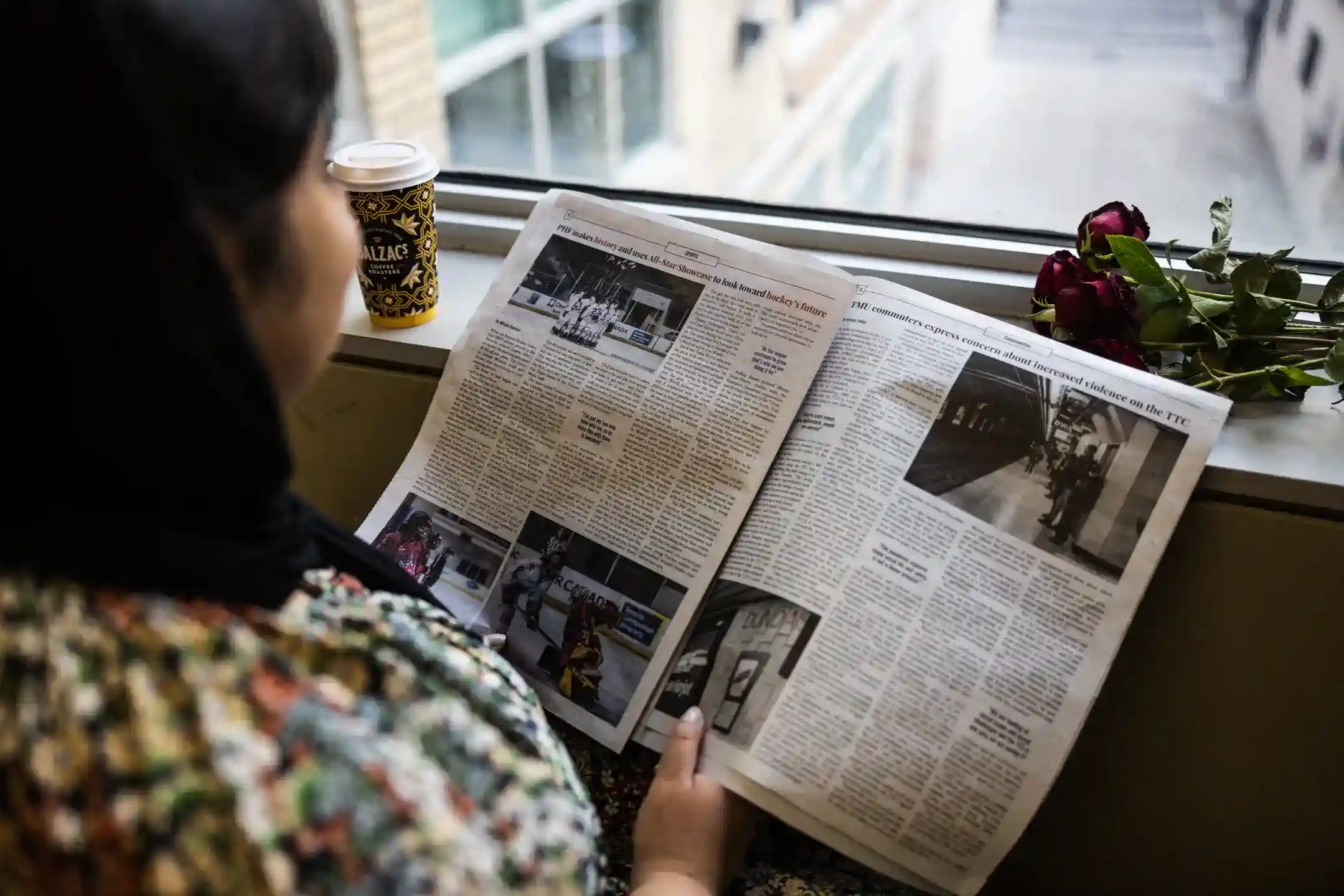CONTENT WARNING: This article contains mentions of suicide and rape.
Rojhin Taebi was soaking in the last bit of her summer abroad in a quaint Tuscan town in Italy. The third-year Toronto Metropolitan University (TMU) professional communications student had been stuck in her room for about a week recovering from COVID-19, missing opportunities to explore the area filled with cobbled streets and cozy corner street cafes.
It was an especially warm July and the town of Cortona, Italy—where Taebi was studying design through a study abroad program with The Creative School—had seen little rain during her two-week stay. So when it finally began to drizzle on her last day there, she seized the moment.

“There was a balcony above the inn we were staying in and I just let the rain come down. It was just such a good feeling, romanticizing that moment. No one was there to see or perceive it except myself,” Taebi said.
The act of “romanticizing your life” has become a
huge trend on social media over the last couple years, encouraging people to appreciate the mundane parts of their everyday routines or to enjoy quiet moments alone.
The hashtag
#romanticizinglife has 30.3 million views on TikTok as of February 2023, as creators document the aesthetically pleasing versions of their commutes to work, morning routines and quiet Friday nights in.
For Taebi, this need for romanticizing her life has become even more apparent as she’s grown older.
“When I became an adult, I noticed that shift between your childhood interests and your adult interests,” she said. “You have to be very mindful and very thoughtful about what you choose to purchase and even how you choose to spend the hours you're not studying.”
As an adult, responsibilities naturally pile on and it can be difficult to appreciate life in general. Because of this, the concept of romanticizing life has become popular for many stressed university students and young adults navigating the pressures of adult life.
Lisa Jeffs, a Toronto-based life and career coach, describes the act of romanticizing life as slowing down and being present in the moment.
“It’s seeing the beauty that is always around us that we often miss because we're always thinking in the future, what needs to get done, what needs to happen or we're thinking about the past,” Jeffs said. When it comes to romanticizing your life, “there is nothing but the present,” she added.
Jeffs noted that part of why life is so fast-paced and stressful these days is due to the rise of hustle culture—the idea that working long hours and sacrificing self-care are required in order to succeed—so taking a breather or appreciating everyday tasks can be beneficial to our mental health and truly has no downfalls.
Taebi shared a similar sentiment, adding that when she’s stressed from studying for an exam, enjoying the simple pleasures that life has to offer makes her feel better.

Romanticizing her life can be something as small as adding a little routine or moment of appreciation to her day, she said.
“Like making a lovely cup of coffee just to start your day… It's seeing something and understanding that there's so much beauty in it,” said Taebi.
Zac Wolofsky, a third-year English student, was sitting in his gender and sexuality class at Vanier College in Montreal during the winter 2018 semester when one of his classmates got upset during a lesson about depression and mental health. The class was discussing how suicide and depression affects genders differently. The classmate was particularly unhappy when the topic of men's mental health and its portrayal in the media came up.
“He was upset that people romanticized suicide, depression, anxiety, things like that. That people romanticize all these negative things,” said Wolofsky.
In popular culture, TV shows like
13 Reasons Why have been criticized for romanticizing mental illnesses and suicide. A
Seattle Times article about depictions of mental illness in pop culture highlights an example of this in the show. At the beginning of the second season, a cheerleader named Jessica returned to school to face her rapist, only to be told “You’re pretty and sad, people love that,” as if her pain and sadness only added to her attraction.
But to contrast this idea, another one of Wolofsky's classmates put her hand up and suggested that romanticization can be good if you focus on the positive aspects of life, like the scent of flowers or people recovering from dark times. According to Wolfosky, this was the first time he heard a phrase for the philosophy of finding joy in mundane, everyday moments.
The idea of enjoying the slow moments in life was comforting to Wolofsky, who was diagnosed with generalized anxiety disorder at the age of 14.
“The only way I could survive was by cherishing all the really good things, even if they were like the littlest possible things like when you get a Lego in the first try," he said. "I've been doing it for a long time because that's just the easiest way for me to survive the chaos that is life.”
Romanticizing life on social media became prevalent during the peak of the COVID-19 pandemic. People were making dalgona coffee to cute
TikTok sounds while filming their everyday walks, essentially finding a way to make doing nothing calm, peaceful and fulfilling.
According to Jeffs, the pandemic exhilarated burnout rates and impacted people’s mental health.

“When COVID hit it was just a whole redesign for a lot of people... People were burning out, we're still burning out,” she said.
According to a 2022
study conducted by Mental Health Research Canada, more than a third of working Canadians reported levels of burn out, almost two years into the pandemic.
Prioritizing mental health and people’s well-being was especially needed. At a time where vacations to tropical destinations were a no-go and celebratory dinner events couldn’t happen, appreciating the mundane parts of life in a new light was, and still is, a necessity, Jeffs said.
“It’s being here on this planet, to enjoy. To really live to our value.”
Wolofsky said the overall pressures of life have also added to this desire to romanticize the simple things.
“Everything has gotten harder for kids our age, and everything has gotten more complicated," he said. "I think, really, ultimately romanticizing life is just a way for people to deal with the pain of it all.”
Life can’t always be exciting. There are only so many major milestones, vacations, defining moments in relationships, birthdays and holidays to look forward to while the days in between include repetitive routines of work, school and going to the gym. But slowing down and appreciating the little things can be just as rewarding.
“There can be beauty in it if you change your framing of mind about it,” Taebi said.



